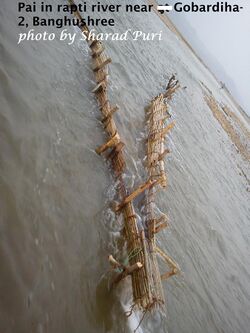Engineering:Pai (fish trap)
Pai (पाई)[1] or sometimes called Pahi (पाही) is a fish trap fabricated by using Thakal daantha (थाकलकॊ डाॅठ) and Beshram (बेश्रम)/byaye (व्याय)/ajambari (अजम्बरी) thoroughly knitting with rope to make large rectangular sheets suitable for the filtration of water and it is mainly famous in Tharu,[2][3] Kumal [4] and Majhi[5] communities of western Nepal. Knitted sheets of their desired length and width are fixed in the river of sharp current with the help of solid and large wooden nails (Kila). This fish trap was a very efficient and logical tool for the ancient indigenous peoples- making them successful in fishing. This fish trap looks like the Greek symbol pi (Π). Indigenous people from near villages of banghushree are still adopting this technique for fishing in West Rapti River.
Methods
The method used for this fish trap is filtration where fishes are considered as suspended solids, rectangular knitted sheets act as a filter, and large wooden nails as a rigid support for the entire system. This fishing method only applies to rivers free from floating derbies and other suspended objects.
References
- ↑ "English: Pai in Audio format". 19 September 2016. https://commons.wikimedia.org/wiki/File:Pai.ogg.
- ↑ "A breif [sic] information about Tharu people residing in Nepal". 16 January 2013. http://path2nepal.blogspot.com/2013/05/a-breif-information-about-tharu-people.html.
- ↑ "History of Tharus – Tharu Community". http://tharucommunity.com/history-of-tharus/.
- ↑ Project, Joshua. "Kumal in Nepal". https://joshuaproject.net/people_groups/12845/NP. Retrieved 20 April 2023.
- ↑ "Buying and Setting up a portable outdoor spa in the most convenient manner in Australia so that you won't get in trouble". http://www.pantribalconfederacy.com/majhi/introduction.php.
 |



